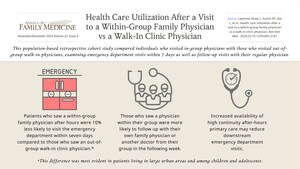Annals of Family Medicine: Study Finds Young Men Want to Discuss Intimate Partner Violence with Doctors
ANN ARBOR, Mich., July 15, 2020 /PRNewswire/ -- While stay at home orders have prevented the spread of COVID-19, they have also given rise to an increase in Intimate Partner Violence (IPV). Nearly a third of all Americans experience IPV within their lifetimes, according to the CDC.
A recent study published in the Annals of Family Medicine found that 90 percent of men believe healthcare providers should be open to discussing the topic of IPV as it pertains to their role as perpetrator, victim, or both. However, of the 916 men aged 18-35 surveyed in the study, only about 10 percent of participants had.
The study was conducted by Tova B. Walsh, Ph.D., of the School of Social Work at the University of Wisconsin-Madison, and researchers from the University of Michigan and the University of Chicago.
Men who reported lower levels of education were most likely to be asked about IPV. Support for discussing IPV with a healthcare provider varied by race and past experience with IPV. Black non-Hispanic men were less likely to think doctors should ask. Victims of intimate partner violence were more likely to support screening.
Walsh and her colleagues write that healthcare professionals are missing opportunities to identify and discuss IPV with men, and to step in with helpful interventions and referrals.
"Education, race/ethnicity, and history of involvement in physical IPV as perpetrator or victim were linked to beliefs about or experiences with being asked by a healthcare provider about IPV among this nationally representative sample of young men….Understanding these associations may aid primary care physicians in identifying male patients who have been perpetrators or victims of IPV, and addressing their needs for mental and behavioral health services, or referral to IPV advocacy organizations for intervention."
The researchers suggest tailored identification and intervention methods to address beliefs about IPV among specific groups of young men, particularly those who disclose IPV perpetration but endorse less support for doctor interventions.
"Further research is needed to assess the best strategies for primary care physicians to use when identifying and responding to IPV among male populations," the authors write.
Prevalence of Intimate Partner Violence and Beliefs About Partner Violence Screening Among Young Men
Tova B. Walsh, PhD, et al
University of Wisconsin-Madison, School of Social Work, Madison, Wisconsin
SOURCE Annals of Family Medicine

Related Links
WANT YOUR COMPANY'S NEWS FEATURED ON PRNEWSWIRE.COM?
Newsrooms &
Influencers
Digital Media
Outlets
Journalists
Opted In







Share this article